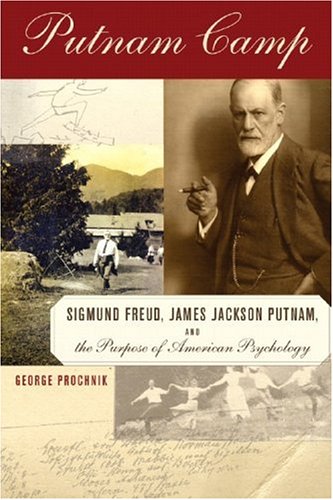Putnam Camp: Sigmund Freud, James Jackson Putnam, and the Purpose of American Psychology Review


I cannot overstate how important i believe this book to be. it is a book about a short stay freud had in america in 1909, during which his great discoveries were watered down for the american market, so to speak, and he was abandoned by colleagues he found he could not trust, particularly by jung, who appears a very unpleasant and nasty person. but the revolutionary material Prochnik has uncovered--stuff i have never seen, read, heard about, or even heard intimated, is that freud had no trouble with homosexaulity (this is more than just being accepting of it) and that he did not mind, even in himself, the fantasies that he knew to be homoerotic and that he himself fanatacized acting upon, on this particular trip with Jung himself. All these years freud's words have been twisted by his "followers" into a hate for homosexuals that he himself never harbored. yes, this is, for this gay reader, one of the seminal new bits of this endless puzzle of why we have been hated, somehow, and that this book, this quiet and beautifully written book by a heterosexual harvard scholar, may help to put right at last. prochnik writes about much more that happened on this trip; he has a cast not only including freud and jung, but also william james, emerson, ferenczi, adler, brill, jones, all the biggies of that day. and he makes you care about them. freud himself is made infinitely moving and sad in a way i have never encountered. by the end of this history, freud is all alone, no friends that once supported him and sat at this feet, his great system of treatment butchered by alien other philosophies of treatment that had nothing to do with what freud said. as i said, i could not put this book down. it took me three whole days and evenings to absorb it. a reader learns a great great deal. now who could ask more for a book than this! larry kramer
An innovative work of biography that traces the lasting impact of the friendship between Sigmund Freud and pioneering American psychologist James Jackson Putnam.In 1909 Sigmund Freud made his only visit to America, which included a trip to "Putnam Camp"—the eminent American psychologist James Jackson Putnam's family retreat in the Adirondacks. "Of everything I experienced in America, this is probably the strangest," Freud wrote of Putnam Camp. Putnam, a Boston Unitarian, and Freud, a Viennese Jew, came from opposite worlds, cherished polarized ambitions, and promoted seemingly irreconcilable visions of human nature—and yet they struck up an unusually fruitful collaboration. Putnam's unimpeachable reputation played a crucial role in legitimizing the psychoanalytic movement. By the time of Putnam's death in 1918, psychoanalysis had been launched in America, where—thanks to the influence of Putnam, and in a development Freud had not anticipated—it went on to become a practice that moved beyond the vicissitudes of desire to cultivate the growth and spiritual aspirations of the individual as a whole.
Putnam Camp reveals details of Putnam's and Freud's personal lives that have never been fully explored before, including the crucial role Putnam's muse, Susan Blow—founder of America's first kindergarten, pioneering educator and philosopher in the American Hegelian movement—played in the intense debate between these two great thinkers.
As the great-grandson of Putnam, author George Prochnik had access to a wealth of personal firsthand material from the Putnam family—as well as from the James and Emerson families—all of which contribute to a new and intimate vision of the texture of daily life at a moment when America was undergoing a cultural and intellectual renaissance.







